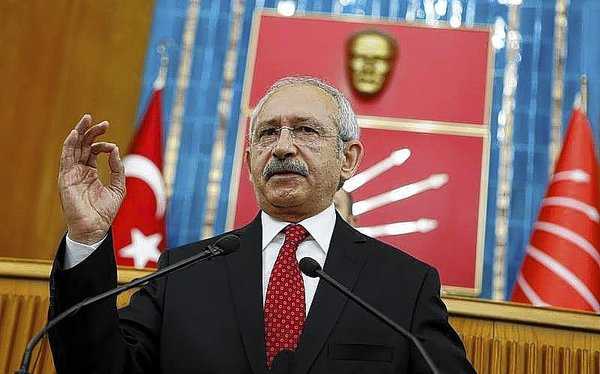Jonny Hogg
Reuters
9:48 a.m. CDT, April 9, 2014
Turkey’s main opposition Republican People’s Party Leader Kilicdaroglu addresses his party MPs during a meeting at the Turkish parliament in Ankara (Umit Bektas Reuters, / April 8, 2014)
ANKARA (Reuters) – Chastened by its failure to dent Prime Minister Tayyip Erdogan’s domination at the ballot box, Turkey’s main opposition is looking to the conservative religious heartland it long shunned and trying to shed its image as bastion of an old secular elite.
Erdogan, arguably Turkey’s strongest leader since Mustafa Kemal Ataturk founded the secular republic on the ashes of the Ottoman Empire, has all but monopolised politics for a decade, aided by the virtual absence of an opposition able to command anywhere near his Islamist-rooted AK Party’s mass support.
His rivals’ hopes that his grip might be weakened by a graft scandal and anti-government protests last summer proved misplaced. The AKP increased its share of the national vote and held the key cities Istanbul and Ankara at March 30 local polls.
“I have decided to emigrate to Izmir,” one disgruntled opposition supporter wrote on Facebook, referring to the Aegean coastal province which remained a stronghold of the staunchly secularist Republican People’s Party (CHP).
The CHP’s mild-mannered leader, Kemal Kilicdaroglu, puts on a brave face. Four years after taking the reins of the party on a reformist agenda, he believes it must vie for the support of millions of conservative Turks who have bought into the Islamist-rooted AK Party’s vision.
“We had aimed to combine under the CHP roof all the forces supportive of the republic, democracy, and the secular system,” he told Reuters in his office in Ankara, noting the party had seen a modest gain in its overall share of the vote but acknowledging it needed to reshape its strategy.
“We have a deep-rooted identity and past. If today we seek the votes of all citizens, we cannot differentiate among them. We need to embrace all and every one.”
Efforts to broaden the CHP’s appeal saw them select a former nationalist party candidate to run for mayor in Ankara, a move that brought them to within one percentage point of victory.
It could now see them try to settle on a consensus candidate in the August presidential race, an election in which Erdogan, bolstered by the 46 percent share of the vote his party won at the municipal polls, is widely expected to stand.
“We’d like to see a candidate who people from all parties will vote for willingly … If such a candidate emerges, we will support them,” Kilicdaroglu said, adding that collaboration with the nationalist MHP party, once anathema to the CHP, would not be out of the question.
Erdogan’s party reaped the reward of its work on social services, from roads and education to health care and refuge collection, in rural areas that had For generations felt neglected under traditional secularist parties.
“Dirt and filth,” Erdogan said, had marked their rule. He saw no place for them in what he called the New Turkey.
The CHP, in the past a mixture of leftist and nationalist forces, has much to do to claim the territory of the poor that should be their natural constituency.
Turkish politics are polarised as scarcely ever before while Erdogan fights what he deems subversive elements in police and judiciary concocting allegations of graft. He accuses a U.S.-based cleric of running a terrorist organisation in cahoots with major opposition parties he labels an “alliance of evil”.
“VAST SPACES OF CONSERVATISM”
The CHP’s voter base has been largely confined to a secular-minded, urban middle class. It controls towns on the Aegean coast and mobilises large numbers in the cosmopolitan centres of Ankara and Istanbul, but little is done to lure the significant Kurdish vote, and the party is almost non-existent in the windswept expanses of the central and eastern Anatolian plains.
Jonathan Friedman, lead Turkey analyst for London-based Control Risks, doubts whether opposition party leaders would be willing to sacrifice their own power in seeking a united front.
“I wouldn’t underestimate the opposition’s inability to cooperate. People are united in being anti-Erdogan but haven’t managed to move beyond that to be ‘for’ something,” he said.
“There is no real sign they’re trying to bring in fresh blood and fresh thinking to move beyond the symbolic politics of the past — waving the flag of Ataturk – and start trying to appeal more seriously to Turkey’s Anatolian heartland.”
Copyright © 2014, Reuters
via Turkey’s humbled secular opposition seeks to shed elitist image – chicagotribune.com.

